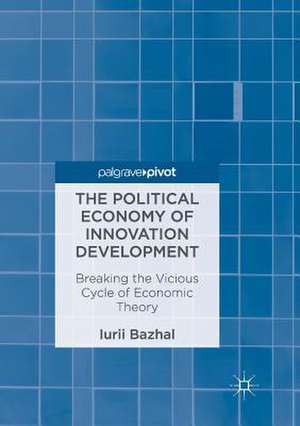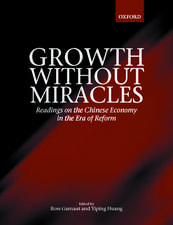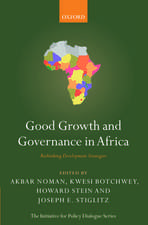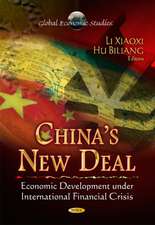The Political Economy of Innovation Development: Breaking the Vicious Cycle of Economic Theory
Autor Iurii Bazhalen Limba Engleză Paperback – aug 2018
Chapters interrogate whether modern economic theory can explain how we ensure the effective functioning of the market economy. The book shows that explanations of economists and politicians regarding the nature of the current economic and financial crisis, and the causes of huge gaps in levels of wealth in market economies, demonstrates that there are not enough satisfactory answers to this question.
Toate formatele și edițiile
| Toate formatele și edițiile | Preț | Express |
|---|---|---|
| Paperback (1) | 411.54 lei 6-8 săpt. | |
| Springer International Publishing – aug 2018 | 411.54 lei 6-8 săpt. | |
| Hardback (1) | 417.68 lei 6-8 săpt. | |
| Springer International Publishing – 17 iul 2017 | 417.68 lei 6-8 săpt. |
Preț: 411.54 lei
Nou
Puncte Express: 617
Preț estimativ în valută:
78.77€ • 85.59$ • 66.21£
78.77€ • 85.59$ • 66.21£
Carte tipărită la comandă
Livrare economică 21 aprilie-05 mai
Preluare comenzi: 021 569.72.76
Specificații
ISBN-13: 9783319855011
ISBN-10: 3319855018
Pagini: 135
Ilustrații: IX, 135 p. 3 illus.
Dimensiuni: 148 x 210 mm
Greutate: 0.19 kg
Ediția:Softcover reprint of the original 1st ed. 2017
Editura: Springer International Publishing
Colecția Palgrave Macmillan
Locul publicării:Cham, Switzerland
ISBN-10: 3319855018
Pagini: 135
Ilustrații: IX, 135 p. 3 illus.
Dimensiuni: 148 x 210 mm
Greutate: 0.19 kg
Ediția:Softcover reprint of the original 1st ed. 2017
Editura: Springer International Publishing
Colecția Palgrave Macmillan
Locul publicării:Cham, Switzerland
Cuprins
Provisional: 1. Key Features of J. A. Schumpeter’s Theory of Economic Development: Its Genesis and Modern Theoretical Approaches.- 2. The “Vicious Circle” of Political Economy Development: The Necrophilia syndrome.- 3. M. I. Tugan-Baranovsky as the Precursor and Founder of the Innovation Theory of Economic Development.- 4. Understanding the Nature of Added Value: Evolution of Theories of Economic Development.- 5. The Innovation Structural Change of Economy as a Main Factor of Economic Development.- 6. Creating a National Innovation Ecosystem.
Notă biografică
Iurii Bazhal is the Head of Economics at The National University of Kyiv-Mohyla Academy in the Ukraine. He is also an Academic of The Higher School Academy of Sciences of Ukraine and Academic-Correspondent Member of Ukrainian Academy of Technological Sciences.He has over 160 publications, including 14 individually and collectively written monographs and 5 textbooks, and has also published a number of scientific articles in Ukrainian and foreign scientific journals.
Textul de pe ultima copertă
This book finds that the R&D and technological innovation of a country is not a result, but a factor, of sustained economic growth. Bazhal develops Schumpeter's theory to argue that genuine economic growth - especially in transitioning and developing countries - is only possible with innovation. With a particular focus on the work of Ukrainian economists, Tugan-Batanobvsky and Vernadsky, the text seeks to move the discipline forward and explain why innovation has become a primary factor of economic development in recent decades and why its role will become even more dominant in the future.
Chapters interrogate whether modern economic theory can explain how we ensure the effective functioning of the market economy. The book shows that explanations of economists and politicians regarding the nature of the current economic and financial crisis, and the causes of huge gaps in levels of wealth in market economies, demonstrates that there are not enough satisfactory answers to this question.
Caracteristici
Presents evidence that indicates the existence of a "life cycle" for each of the core economic theories Seeks to better understand the contemporary failures of economic policy Places 'innovation' as a new concept within political economy













